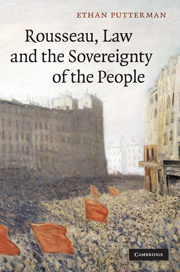Book contents
- Frontmatter
- Contents
- Acknowledgments
- A note on the text
- List of abbreviations
- Introduction: The celestial voice
- 1 Rousseau's concept of law
- 2 Agenda-setting and majority rule
- 3 Democracy and vote rigging
- 4 Popular sovereignty and the republican fear of large assemblies
- 5 Enforcing the laws in Poland and Corsica
- 6 Judging the laws/when legislation fails
- Conclusion: Law and liberty
- Select bibliography
- Name index
- Subject index
4 - Popular sovereignty and the republican fear of large assemblies
Published online by Cambridge University Press: 04 August 2010
- Frontmatter
- Contents
- Acknowledgments
- A note on the text
- List of abbreviations
- Introduction: The celestial voice
- 1 Rousseau's concept of law
- 2 Agenda-setting and majority rule
- 3 Democracy and vote rigging
- 4 Popular sovereignty and the republican fear of large assemblies
- 5 Enforcing the laws in Poland and Corsica
- 6 Judging the laws/when legislation fails
- Conclusion: Law and liberty
- Select bibliography
- Name index
- Subject index
Summary
According to Jeremy Waldron, “the clear consensus in the canon of legal and political thought” is “that the size of a legislative body is an obstacle, rather than an advantage, to rational decisionmaking” and, as such, large assemblies give rise to “jurisprudential unease about legislation.” Originating “in ancient prejudice that surfaced during the Enlightenment,” the source of this unease is said to be that “legislation is not just deliberate, administrative, or political: it is, above all, in the modern world, the product of an assembly – the many, the multitude, the rabble (or their representatives).” Within this canonical consensus large assemblies are said to be irrational and occasionally demagogic because they are endowed with traits more characteristic of a rabble than of a selectively chosen self-legislating elite.
This description by Waldron is given substance in the writings of a number of eighteenth- and nineteenth-century theorists of representative government as well as critics of democracy during the early part of the twentieth century. According to David Hume, for example, “all numerous assemblies, however composed, are mere mob.” Similarly, James Madison writes that in “all very numerous assemblies, of whatever characters composed, passion never fails to wrest the sceptre from reason. Had every Athenian citizen been a Socrates; every Athenian assembly would still have been a mob.”
- Type
- Chapter
- Information
- Rousseau, Law and the Sovereignty of the People , pp. 96 - 121Publisher: Cambridge University PressPrint publication year: 2010



